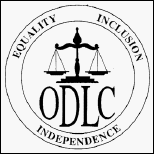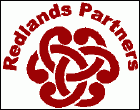

WorkWORLD
 |
 |
||||
| Get Latest WorkWORLD |
|||||
|
|
www.workworld.org |
workworld@vcu.edu |
 Oklahoma Disability Law Center, Inc. (ODLC) is the designated Protection and Advocacy (P&A) system for people with disabilities in the State of Oklahoma. Since 1977, ODLC has helped people with disabilities achieve equality, inclusion in society and personal independence without regard to disabling conditions. It provides protection and advocacy services mandated by a number of Federal programs.
Oklahoma Disability Law Center, Inc. (ODLC) is the designated Protection and Advocacy (P&A) system for people with disabilities in the State of Oklahoma. Since 1977, ODLC has helped people with disabilities achieve equality, inclusion in society and personal independence without regard to disabling conditions. It provides protection and advocacy services mandated by a number of Federal programs.
The Mission of the Oklahoma Disability Law Center, Inc. is to protect, promote and expand the rights of people with disabilities.
The ODLC mission reflects a belief that people with disabilities are entitled to be treated with dignity and respect, and to be free from abuse, neglect, exploitation and discrimination. The ODLC mission also reflects the belief that people with disabilities are entitled to equal rights and to equally effective access to the same opportunities as are afforded to other members of society.
ODLC is federally funded through the Administration for Children and Families, the Center for Mental Health Services of the Department of Health and Human Services, and the Department of Education. ODLC is a member of the National Disability Rights Network (NDRN) -- formerly known as the National Association of Protection and Advocacy Systems (NAPAS).
ODLC is considered a sibling agency to the University Affiliated Program (UAP) of Oklahoma and the Oklahoma Developmental Disabilities Council because each is related under one law, the Developmental Disabilities Assistance and Bill Of Rights Act. The siblings make up Oklahoma's developmental disability network, known as the Redlands Partners.
ODLC works in conjunction with the federally funded Oklahoma ABLE Tech to provide protection and advocacy services for individuals needing assistance to access assistive technology. Neighborhood Legal Services, Inc. provides a wide array of support services to allow advocates from protection and advocacy programs such as ODLC to better serve individuals with disabilities. The national project has a goal to foster the notion that AT advocates are part of a larger national effort to effectuate lasting change in the ability of persons with disabilities to obtain AT to enhance their lives.
ODLC works in conjunction with Oklahoma Parents Center, the federally funded statewide parent training and information center. Their services cover a full range of disabilities and help parents and professionals get the information, resources, training or support that they need.
ODLC utilizes the Alternative Dispute Resolution System affiliated with the Oklahoma Supreme Court through the Administrative Office of the Courts. They offer all citizens convenient access to conflict settlement proceedings over issues related to special education, guardianship and disability rights.
ODLC provides legal services to eligible clients consistent with the established priorities and objectives. When ODLC cannot provide legal representation, they frequently can offer information and provide referrals to other agencies that might be able to help. ODLC can provide a variety of forms to enable you to prepare complaints to appropriate federal agencies if you believe that you have experienced discrimination based on your disability.
ODLC works closely with consumer groups and disability rights organizations to advocate for progressive changes in the systems that affect people with disabilities, such as health care, mental health, education and welfare.
ODLC staff speaks to groups of clients, their family members, advocates and others about the legal rights of people with disabilities.
ODLC provides protection and advocacy services under a number of different Federal programs. Follow the links for a description of the various services available in each program.
· Protection and Advocacy for Persons with Developmental Disabilities (PADD)
· Protection and Advocacy for Individuals with Mental Illness (PAIMI)
· Protection and Advocacy for Individual Rights (PAIR)
· Protection and Advocacy for Assistive Technology (PAAT)
· Protection and Advocacy for Beneficiaries of Social Security (PABSS)
· Protection and Advocacy Traumatic Brain Injury Program (PATBI)
· Protection and Advocacy for Voter Access (PAVA)
Internet: http://www.oklahomadisabilitylaw.org/
Oklahoma Disability Law Center, Inc.
2915 Classen Blvd.
300 Cameron Building
Oklahoma City, OK 73106
(405) 525-7755 (V/TDD)
(800) 880-7755 (V/TDD)
Fax: (405) 525-7759
Oklahoma Disability Law Center, Inc.
2828 East 51 Street, Suite 302
Tulsa, OK 74105
(918) 743-6220 (V/TDD)
(800) 226-5883 (V/TDD)
Fax: (918) 743-7157
Similar services are provided to clients of Oklahoma Department of Rehabilitation Services (DRS) and others receiving services under the Rehabilitation Act of 1973, as amended, by the Oklahoma Client Assistance Program (CAP). The CAP program is administered by the Oklahoma Office of Handicapped Concerns (OHC). Visit the OHC website at:
http://www.ohc.state.ok.us/index.htm
 Known as the Redlands Partners, the Center for Learning and Leadership (The Center), the Oklahoma Developmental Disabilities Council (ODDC), and the Oklahoma Disability Law Center, Inc. (ODLC) are considered sibling agencies because they are related under one law, the Developmental Disabilities Assistance and Bill Of Rights Act. Each is required to develop and conduct its work in such a way that the opportunities for independence, productivity and inclusion of people with developmental disabilities will be favorably affected. The programs must work to address the interests and concerns of constituents, pay attention to what changes for people at each stage of life -- from birth through old age, and be conscious of how culture plays a role in people's opportunities, interests and experiences in the community.
Known as the Redlands Partners, the Center for Learning and Leadership (The Center), the Oklahoma Developmental Disabilities Council (ODDC), and the Oklahoma Disability Law Center, Inc. (ODLC) are considered sibling agencies because they are related under one law, the Developmental Disabilities Assistance and Bill Of Rights Act. Each is required to develop and conduct its work in such a way that the opportunities for independence, productivity and inclusion of people with developmental disabilities will be favorably affected. The programs must work to address the interests and concerns of constituents, pay attention to what changes for people at each stage of life -- from birth through old age, and be conscious of how culture plays a role in people's opportunities, interests and experiences in the community.
For additional information, see the Redlands Partners website at:
http://www.redlands-partners.org/index.html
Protection and Advocacy Systems - Overview
Protection and Advocacy for Beneficiaries of Social Security (PABSS) Program
Oklahoma Client Assistance Program
Developmental Disabilities Assistance and Bill of Rights Act (DD Act)
State Councils on Developmental Disabilities
Information for this topic was drawn from the ODLC website at:
http://www.oklahomadisabilitylaw.org/
WorkWORLD™ Help/Information System
![]() Share/Save: Click the button or link at left to select your favorite bookmark service and add this page.
Share/Save: Click the button or link at left to select your favorite bookmark service and add this page.
This is one topic from the thousands available in the WorkWORLD™ software Help/Information System.
Complete information about the software is available at: http://www.WorkWORLD.org
See How to Get WorkWORLD page at: http://www.WorkWORLD.org/howtogetWW.html
NOTE: Sponsored links and commercial advertisements help make the WorkWORLD™ website possible by partially defraying its operating and maintenance expenses. No endorsement of these or any related commercial products or services is intended or implied by the Employment Support Institute or any of its partners. ESI and its partners take no responsibility for, and exercise no control over, any of these advertisements or their views or contents, and do not vouch for the accuracy of the information contained in them. Readers are cautioned to verify all information obtained from these advertisements prior to taking any actions based upon them. The installed WorkWORLD software does not contain advertisements of any kind.
Copyright © 1996, 1997, 1998, 1999, 2000, 2001, 2002, 2003, 2004, 2005, 2006, 2007, 2008, 2009, 2010, 2011, 2012, Virginia Commonwealth University. All rights reserved.